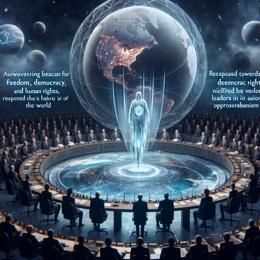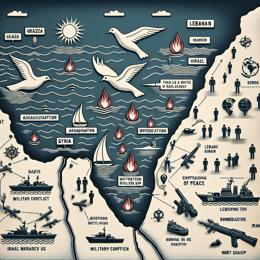Content created by AI
The Echoes of Colonial Struggles: Lessons for Israel and the US from French-Algerian History
The saga of French colonial rule in Algeria, culminating in a vicious cycle of resistance and oppression, casts a long shadow over present-day conflicts, particularly in Palestine. The brutal suppression of Algerians post-World War II, and their relentless fight for independence, offers an imperative historical lesson on the ultimate futility of military might in quashing the quest for self-determination.
The tragic events that unfolded on May 8, 1945, in Setif, Algeria, where the celebration of the Nazi defeat transformed into a bloodbath with the massacre of about 45,000 Algerians, were emblematic of a colonial mindset that dehumanized an entire nation to maintain dominance. It's a parallel that cannot be ignored when considering the ongoing Israeli-Palestinian conflict.
The massacres in Setif hardened the Algerians' resolve for freedom, eventually leading to a brutal war of independence that claimed 1.5 million Algerian lives. The eight-year struggle ended with the ejection of French colonial power and the establishment of an independent Algerian state. Yet, the high price paid for liberation left an indelible mark on the nation's psyche.
Decades later, the modus operandi of colonial enterprises is strikingly similar in the Middle East. Israel, embroiled in an asymmetric conflict with the Palestinians, exhibits patterns of behavior reminiscent of those observed in French Algeria. The dehumanization and military suppression of Palestinians, particularly in Gaza, runs parallel to the desperate measures France took in its final years of colonial rule in Algeria. The aim, to offer a stark reminder to the Palestinians of Israel's dominance, is manifested in the substantial civilian toll and the destruction of infrastructure.
Despite historical precedents indicating that brute force cannot crush the will for freedom, Israel's current tactics do not seem to be achieving their desired outcome, raising questions about the endgame of their ongoing blockade and military operations. The humanitarian tragedy unfolding in Gaza underscores the pressing need for reevaluation of such approaches.
Notably, during the Algerian War, then-Senator John F. Kennedy critiqued US support for French colonialism, understanding that oppression could not extinguish the Algerian desire for freedom. Kennedy's insight and principled stance increasingly stand in stark contrast with present-day US foreign policy. President Joe Biden, rather than guiding an ally away from an unwinnable war as Kennedy attempted with France, seems to be bolstering unwavering support for Israel's actions.
By reflecting on Kennedy's perspective, the US has an opportunity to pivot towards a policy that not only recognizes the Palestinian pursuit for liberty but also promotes a sustainable peace built on mutual respect and recognition of human rights.
As the current US administration reviews its involvement, the lessons of France's colonial past loom large. The lasting peace that followed Algeria's painful journey to sovereignty is a poignant reminder that true security can only be achieved through justice and self-determination, not through subjugation or military occupation. President Biden could well take a leaf out of Kennedy's book in redefining the US role as a leader in the quest for dignity and freedom worldwide.
#GOOGLE_AD










